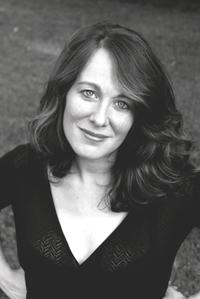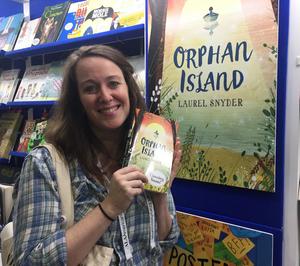
|
|
| photo: Sonya Naumann | |
Laurel Snyder is a poet, essayist, teacher and author of picture books and novels for children, including The Longest Night, Bigger than a Bread Box, Seven Stories Up and her new middle-grade novel, Orphan Island (Walden Pond Press/HarperCollins, May 30, 2017). She is also a graduate of the Iowa Writers' Workshop. Here, Snyder talks with Shelf Awareness about Orphan Island, the nature of childhood and the advantages of staring at the ceiling.
In Orphan Island, nine children live by themselves on an island, and every year or so a small green boat brings a new child and takes the oldest one, the Elder, away. No one knows how or why. How did this idea pop into your head?
It came from a couple of different places. My grandfather was a doctor at Okinawa and many of his patients were children, orphans whose parents were civilian casualties of the war. So my initial idea was that Orphan Island could be a historical novel set on Okinawa.
Years later, I was reading The Little Prince to my sons, and I found myself thinking about allegory. It was something I wanted to try, creating a world representing something other than just that world. The next book we read was My Side of the Mountain, and what I was struck by was both the lack of adults in the book and also the ability of kids to do for themselves--the physical doing. We also had that response to the Little House books. Kids who know how to cook and clean and fish and build and use tools. That was very exotic and exciting for my children. So all that got swirled together in my head, and Orphan Island is what happened.
That makes sense. So, in what way is Orphan Island an allegory?
When I started it, I was thinking about parenting... which is sort of deadly for a children's book, since that's about adults and not about children. But I was thinking about our unwillingness to let kids loose. Our unwillingness to stop protecting them. And the things that they don't learn because we don't stop protecting them.
As I moved along, the book became more about childhood--the idea that children should feel safe and protected, but need to at some point step out into the world as an adult. There's the moment where a kid is leaving the safe space, and really wants to, but at the same time, is terrified. I think it's pretty obvious. The island is the safety of childhood, and Jinny is navigating that awareness of safety and what is beyond safety.
That parenting theme still feels pretty strong... in particular, Jinny's feelings about having to take care of Ess when she arrives in the boat: frustration, exhaustion, joy, love, the desire to protect.
Yes, right. Jinny becomes the parent.
The emotions felt so true I wondered if some of Jinny's internal dialogue came straight from your experience.
I have my own children, but in fact Ess is my sister Emma. My parents divorced when I was eight and Emma was two. Years later, when I was 15, my father had a son from a second marriage, so I suddenly had a baby brother. That was wrapped up in it, too. I'm definitely an oldest child.
It's an important thing about siblinghood that you love these people, and that you own these people. They are your people until the day you die and you're jealous of them and you resent them and you snoop in their drawers--all that is true and they can be the most important people in your life. My sister--the book is dedicated to her--is the most important person in my life. But that doesn't mean she doesn't drive me absolutely crazy.
Back to the allegory question, if Orphan Island represents the safety of childhood, would you call it a utopia?
When I would describe the book to people they would say, so it's like James Dashner's Maze Runner. And I'd say no, it's really not like Maze Runner. It seems we're so primed right now for dystopia that people could only understand the island as a response to something terrible. And it was very important to me that it would not be a dystopian book. This is actually, genuinely, a perfect place.
Did you model your island after any island in particular?
In my head it was off the mid-Atlantic coast, somewhere between Delaware and North Carolina, just because that was the beach I grew up with. But I gave myself license. Once you're in a place where magic boats arrive unmanned, you can also say, "And you have peaches year-round!" You're allowed to create a ridiculous growing season.
Your island is magical. The green boat comes and goes "as if pulled by an invisible string." The snakes don't bite. Breezes keep children from plummeting off cliffs. Tell us about the process of writing and world-building.
It was a slow process, three years from start to finish. I had just finished a multi-book contract. I wasn't trying to create a book. I literally spent time staring at the ceiling and thinking. Once I got started I wrote it longhand on a legal pad with a mechanical pencil. I mean, I was trying to slow myself down. I got to take all the time I wanted, just doing the layering. And then there were many, many passes, adding detail or strengthening the world-building and characters.
 |
|
| Laurel Snyder at ALA earlier this year. | |
Every Elder must teach the newly arrived child swimming, reading and cooking. How did you come up with these three essential skills?
That is actually from the Talmud. Jews are supposed to teach their children to read the Torah, to support themselves and to swim. And I always thought that was fascinating, that there was a Jewish requirement to teach your children to swim.
Are you Jewish?
Yes. There were other references in there, too, such as the idea of a bar mitzvah or bat mitzvah, a moment when life changes for you and you are no longer a child.
This is Jinny's coming-of-age story. You said in your blog that "kindness and niceness are not the same thing" and that seems true of Jinny. She's kind, but not necessarily nice.
Middle-school readers, ages 11 and 12, really need books that allow them to explore all aspects of themselves, including the ones they're reprimanded for having. Being 12 was awful for me personally. It's just a hard age. Your body is changing and your brain is changing, and you want independence and you're scared of independence. You want to be taken care of and you resent it. It all gets mixed up and what it produces is not always a nice person. I feel like you can still love Jinny and empathize with her and identify with her, and realize that we all make mistakes.
Your child-only society is much more orderly than, say, William Golding's Lord of the Flies. How would you say the self-governing on Orphan Island is different?
This is a basic political theory question, right? In general, societies can run as long as everyone feels they have enough. We see this with animals, too. The minute there's not enough scraps for the dogs they start fighting with each other. On Orphan Island, the children's basic needs are met. They have community. They feel loved. The tension comes in when people, for whatever reason, feel they aren't getting what they need. And in that sense, this whole story gets kicked off because Jinny loses Deen. She doesn't have what she needs anymore.
Much of the suspense in your novel comes from the fact that we don't know how the island works. Will we ever find out?
I felt like I wanted this to be an imitative experience for the reader. Jinny is full of confusion. She doesn't know things. And that's not just Jinny, that's 12, that's 13, that's what this age feels like. You have no power, you want power. You have no information, people won't answer your questions. Even if they do answer your questions honestly, it may or may not make sense to you.
The challenge to writing a sequel to a coming-of-age story demands that you're then on the other side of coming of age. I feel like following the story to where Jinny does or doesn't find and reconnect with Deen wouldn't be a middle-grade book. But just recently I think I figured out a key that unlocks how I could write a prequel, so I'm outlining that right now.
That is great news. I definitely want to know, if Orphan Island represents the safety of childhood, what lies beyond that wall of mist.
Well, anything can happen, right? I mean, we keep our children safe in our houses and then one day we open the door. And everything that's in the world is out there. We do what we have to do to keep ourselves sane, and imagine that some of those things won't happen, and most of them won't happen, but the potential is all there, and that's the issue. --Karin Snelson

